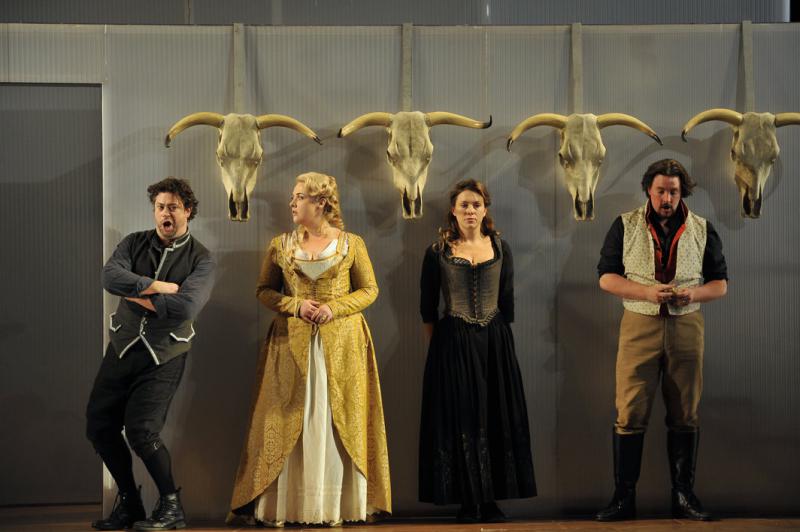The Marriage of Figaro is thee comic opera renowned for being one of Mozart’s wondrous masterpieces: its overture is recognisable even to non-opera fans. It is performed in most opera house repertoires and, to some, considered a safe-bet for opera first-timers. Yet the challenge opera directors, and respective opera houses, have to face is attempting to re-produce The Marriage of Figaro in an interesting way for opera newbies, which, interchangeably, doesn’t bore veteran operagoers at the same time.
The ENO’s first revival of Fiona Shaw’s 2011
production is staged again this season which brings together her own solution
to such a conundrum; her innovative and novel interpretation of Figaro is something entirely
hers, that I haven’t seen relayed in any other production.
Instead of the usual 17th
century staging or costume designs, that we are used to, Shaw presents a subtle
take on Beaumarchais’s story. A flawless
white-painted home, minus a roof, revolves slowly on stage. The house is like
a never-ending maze as we watch our characters walk around this circular stage, entering brand new rooms that we hadn’t seen before with various servants
attending to their domestic chores; a clever device by Shaw, no less, that brings
out the gossip and whispering world of the Count’s home, and the social divide
between the noble and working classes.
David Stout is quite an interesting Figaro who is easily tickled by Susanna (Mary Bevan). He yelps loudly to her affectionate
ways. He sings well as the ideal and bubbling Figaro we have stuck in our minds. The
moment he steps on stage, he's tries to trap a bee in a harpsichord and the
overture hasn’t even begun, yet!
Jaime Martin conducts the ENO orchestra with
the overture taking over the buzz of the flying nuisance: another quirk of Shaw,
yet again! The music was played loudly and in a ballsy manner; I could hear the boldness even from my balcony seat,
which (I’m sure) Martin was aiming for: bringing attention to all of Mozart’s
luscious notes.
Bevan’s depiction of Susanna was a
delight. Her character was a box of many tricks: witty, smart, sensitive, passionate, loving
and sexy at the same time. She set the standards for any mezzo who intends to sing the model Susana. Her voice was loyal and seductive throughout the show as well. Her early introductory scenes with
Figaro were especially playful particularly when they play a silly hat game together with Mozart's jovial music.
The countess, on the other hand, had a
different demeanour and vocal sound altogether. Sarah-Jane Brandon held her
own and sung with utter smoothness, grandeur and tenderness. (I thought to
myself, the only thing missing on the stage was cherubs feeding her grapes.)
This all made sense as the wife of the estate.
This starkly contrasted with Samantha
Price as our going-through-puberty Cherubino. Her naïve boy appearance, with
raging hormones ,was on point, yet vocally, for Price (it was her debut role) and
understandably, not always consistent. Nonetheless she tried her hardest to reach the
peak of Cherubino’s teenager angst through high notes, where needed. Not hitting the mark, but a good effort irrespectively.
Jonathan Best as Dr Bartolo and
Lucy Schaufer as Marcellina were also important cast members that added to the
amusing drama and slapstick going-ons. When Figaro finds out they are his parents, the
reaction from the audience is positive and well deserved.
Benedict Nelson as the Count however
seemed to have lacked the ability to see the humour or be part of the humour on stage. Although vocally strong and successful in showing off a serious,
self-important and arrogant count, I felt, that he played too hard on the
opera-seria role in an opera that is meant to be an opera-buffa.
Peter McKintosh’s stage design is also interesting. The scenes are brought up-to-date in Spanish costume but with many
bull skulls and matadors to add to the opera's sexual tone; all done with cheeky methods and metaphors thanks to Jeremy Sams' naughty and slick translation.
Undoubtedly there's a lot of laughs to be had with Shaw’s revival, yet there were
just a few things I wasn’t sure about. Barbarina sung by Ellie Laugharne was elegantly done, yet she was almost used as
a prop and distraction from the scene changes taking place just before Act III.
She was pretending to vomit from the excessive marriage celebrating, which made
some audiences either like it or feel a tad confused: I was part of the latter group. And although done for a cheap gag, I wasn’t entirely convinced by a
blind Don Basilio done by Colin
Judson. The irony of him singing ‘I see…’ when his character is - clearly - incapable of
doing so, was a bit off. Again, these are little quibbles I have that didn't -completely- put down
the entertaining evening I had.
Marriage of Figaro is showing until the 23rd November. Click here for more details.
I purchased my own tickets. Photos are courtesy of the ENO and Mark Ronan's blog.
#ENOfigaro Lots of funny bits with stage hiccups,but who cares!Well done #MaryBevan #SarahJaneBrandon #Petermckintosh pic.twitter.com/50h3f8gVha
— Mary Grace Nguyen (@MaryGNguyen) October 28, 2014










%2C%2BMary-Jane%2Bde%2BHavas%2B(Basilio)%2B%26%2BNick%2BDwyer%2B(Count)%2Bphotography%2BChristopher%2BTribble.jpg)
%2C%2BNick%2BDwyer%2B(Count)%2B%26%2BFae%2BEvelyn%2B(Countess)%2Bphotography%2BChristopher%2BTribble.jpg)